
Austin's License Plate Reader Program: A Closer Look
In a surprising turn of events, Austin City Manager T.C. Broadnax has opted to withdraw the controversial license plate reader program from the City Council agenda, a decision highlighting the growing concerns surrounding privacy and governmental oversight. As cities across the nation adopt advanced surveillance technologies, the need to balance public safety with individual privacy rights becomes increasingly crucial.
Privacy at the Forefront: Community Reactions
During a recent council work session, various council members expressed significant concerns regarding the potential misuse of data collected from the license plate readers. Particularly, the fear that police could share this information with federal immigration authorities to track immigrants raised alarm bells. Council Member Zo Qadri emphasized the implications of a recent city audit which revealed that local law enforcement might be compelled to share data collected by Flock Safety, the vendor providing this technology.
Community advocates reflected similar sentiments. Many residents have voiced their objections, arguing that such surveillance disproportionately affects marginalized groups, particularly immigrants and women seeking reproductive healthcare. With Austin becoming a battleground for these issues, the voices from the community become crucial in shaping the city's policies.
The Argument for the Technology: Law Enforcement's Perspective
Defenders of the license plate reader program, including Austin Police Chief Lisa Davis and Assistant Chief Sheldon Askew, contend that the technology has proven invaluable in solving crimes. They argue that the data retention policy—storing information for only seven days—ensures that the program does not contribute to long-term surveillance or misuse. However, questions linger about accountability and transparency, particularly when audits show that a notable percentage of searches lack proper justification.
Despite law enforcement’s assurances, skepticism remains. As indicated in a report by 404 Media, other jurisdictions have misused similar technologies to breach civil liberties. This reality necessitates a thorough discussion on the oversight of police technologies to prevent overreach and misuse.
Historical Context: License Plate Readers in Austin
The active phase of Austin's license plate reader program dates back several years. Initially introduced, it faced immediate backlash from privacy advocates, leading to its suspension in 2020 amidst heightened privacy concerns. Despite implementing safeguards before the program's revival in 2023, ongoing debates reveal that many citizens remain unconvinced about its safety.
The infrastructure now includes about 40 Flock cameras and approximately 500 additional cameras mounted on police vehicles. The volume of data collected—113 million scanned license plates in one year—raises concerns about the potential for misuse and data exploitation.
Community Advocacy and Future Dynamics
With the withdrawal of the license plate reader agenda item from the council, community advocates see this as a moment to reevaluate the technology's role in urban safety. Many hope the city will prioritize public discourse and transparency over technology expansion.
Local activist groups have rallied and voiced their stances, urging city officials to weigh the social costs of surveillance within the community against its purported benefits. Moving forward, it is critical for residents and officials alike to navigate these waters with caution, ensuring that democracy and civil liberties remain intact amidst evolving technological landscapes.
Conclusion: Navigating the Future of Surveillance in Austin
As Austin continues to grapple with the complexities of modern surveillance technologies, the dialogue surrounding the license plate reader program serves as a pivotal case study. It underscores the delicate balancing act of ensuring public safety while protecting civil liberties. For residents and policymakers alike, remaining engaged in these conversations is imperative.
To stay informed about Austin’s evolving policies and the ongoing debate surrounding surveillance technology, residents are encouraged to engage with local news outlets and participate in city council meetings.
 Add Element
Add Element  Add Row
Add Row 



Write A Comment